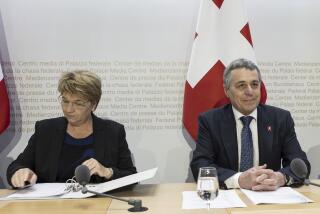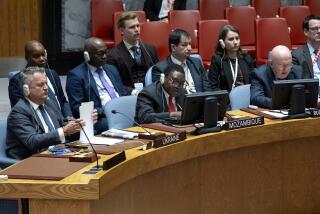Moscow and Human Rights
- Share via
Fifteen months ago the Soviet Union made known its desire to be the host to an international human-rights conference in Moscow in 1988. The American and most other Western governments do not believe that Moscow would be an appropriate site, considering the Soviet Union’s long and continuing record of human-rights violations.
The Soviet government, in an apparent move to blunt opposition to its proposal, has invited an international federation of human-rights groups to visit Moscow for a discussion of human rights in the Soviet Union. The unprecedented invita-tion was accepted; a 19-person delegation from 10 countries, including the United States, will arrive in the Soviet capital on Jan. 25.
The visit should be an intriguing experience; it could also prove to be important.
According to Helsinki Watch, a New York-based group that monitors compliance with the human-rights provisions of the 1975 Helsinki accords, the Soviet invitation was extended in late September to the International Helsinki Federation for Human Rights, or IHF. The Vienna-based umbrella group unites 13 national Helsinki committees, including the U.S. Helsinki Watch.
Spokesmen for Helsinki Watch speculate that the Soviets, by inviting a private citizens’ group to Moscow, may be trying to display a new openness on human-rights issues. If the Kremlin imagines that these particular visitors can be manipulated, however, it will be disappointed.
Spokesmen for the citizens’ delegation have already served notice that in high-level meet-ings with Soviet officials they will raise questions about Soviet abuses of political prisoners, incarceration of dissidents in psychiatric hospitals and restrictions on emigration, travel, religion and free speech.
Members of the human-rights delegation also want to visit six Soviet citizens who they say are being held in Perm 36-1, a special labor camp, for trying to monitor Soviet compliance with the Helsinki agreement, to which the Soviet Union is a signatory. They also expect to meet with inde-pendent groups and private citizens for a discussion of human-rights issues.
In effect the IHF is challenging the Soviet Union to prove that it’s the sort of place where an inter-national conference on human rights would be appropriate. Helsinki Watch says that the visit will be closely watched by Western delegates to the Helsinki Review Conference in Vienna, and that the results “may influence their thinking” with regard to the conference proposed by Moscow.
To pass the test the Soviets have only to in-augurate credible legal and institutional guarantees against future human-rights abuses. But that’s a tall order. Even in the less repressive atmosphere introduced by Soviet leader Mikhail S. Gorbachev, violations of fundamental human rights continue. It’s hard to see how, in practice, the regime’s continuing insistence on a Communist monopoly of power can be reconciled with the individual freedoms commonplace in the West.
More to Read
Sign up for Essential California
The most important California stories and recommendations in your inbox every morning.
You may occasionally receive promotional content from the Los Angeles Times.










